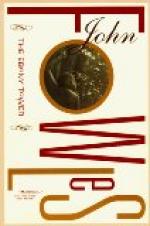|
This section contains 4,300 words (approx. 15 pages at 300 words per page) |

|
SOURCE: "The Passion of Existence: John Fowles's The Ebony Tower" in Critique: Studies in Modern Fiction, Vol. XXV, No. 1, Fall, 1983, pp. 1-10.
In the following essay, Sollisch relates the principal themes of The Ebony Tower to Fowles's version of humanity's Fall: "not from innocence to knowledge but from knowledge to mystery."
The fiction of John Fowles is concerned primarily with the search for mystery and self-knowledge. Without mystery, there is no real life, no passion to exist. To Fowles, "Mystery, or unknowing is energy."1 Most of his characters begin without mystery, secure in their conventions and eventually are forced to see beyond the stale metaphors of their lives into the world of mystery. Some characters, like Nicholas Urfe in The Magus, eventually accept the existential responsibility of being—they are forced to see into the mystery, and they embrace it; others catch a glimpse of this passion and...
|
This section contains 4,300 words (approx. 15 pages at 300 words per page) |

|


